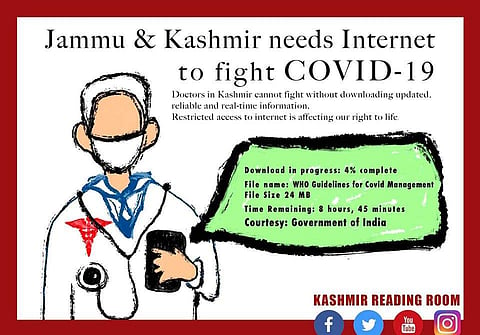

On average, how much time does it take to download a 24 MB file? This, by the way, is the size of the PDF that contains the WHO guidelines for COVID Management. Now what may seem as a shocker to a lot of us is a particular poster uploaded by a group Kashmir Reading Room, which is said to be based on an account by a Kashmiri doctor. The poster says that the doctor apparently took approximately 9 hours to download the file.
"Doctors in Kashmir cannot fight (the virus) without downloading the updated, reliable information. Restricted access to the internet is affecting our right to life," reads the hard-hitting poster. "Since August 5, 2019, India has imposed the world's longest shutdown of the internet in Kashmir. The ban on communication and the internet has effectively crushed our economy, e-commerce and now with the emerging threat of COVID-19, our doctors are also unable to access essential medical updates from around the world," says Ali*, a member of the group, whom we caught up with over email.
Ali tells us how art was the easiest way for the group to convey the message to mainland India about the situation in the valley and how things have changed for them since the lockdown, post the abrogation of Article 370. We were curious to know more about the group and how it was creating awareness about Kashmir, especially during the lockdown. Excerpts from a conversation from Ali and his teammate Neha*.
What is the Kashmir Reading Room all about?
Kashmir Reading Room was set up by a group of professionals from diverse backgrounds primarily based in India with some members in the UK, EU and the Middle East. Our objective is to decriminalise free political thought and nurture conversations between Indians, Pakistanis and Kashmiris. In this regard, we work towards developing a repository of educational material for awareness on political and humanitarian issues of the people of this region by way of educational campaigns, seminars, workshops, demonstrations and art.
What are the sort of activities that you undertake?
In the past six years, we have worked with a number of civil society groups to organise discussions on the legal, political and social history of the conflict in Kashmir. Our members have delivered seminars on Kashmir at leading universities around the world such as the University of Oxford, University of Cambridge, SOAS University and also in India at universities such as Tata Institute of Social Sciences, University of Mumbai and Ambedkar University Delhi. We have also organised discussions with students, activists, working professionals, workers’ unions and bastis about the adverse effects of the prolonged conflict in Kashmir on the people of India.
How bad is the situation in Kashmir, especially after the nationwide lockdown?
The Coronavirus outbreak and ensuing lockdown were used to further curb civil liberties and increase surveillance on Kashmiris. The crisis has proven to be an opportunity for the government to centralise control over the erstwhile state by notifying the Domicile law which would have been met with fierce resistance by people under normal circumstances.
While in India, students have resumed new sessions through online classes, this has not been a possibility for students in Kashmir due to slow internet connectivity. This is an addition to a loss of normal schedule of classes over the last seven months when Jammu and Kashmir was under an indefinite lockdown. In Kashmir, students were promoted without exams or classes since the recently restored 2G internet can not sustain classes or exams.
Has the group's functioning been difficult?
We have observed that our Indian audiences are retreating into various forms of denial. We often find them indulging in dismissive argumentation justifying the outrightly unconstitutional and undemocratic actions of the government. Our work is merely educational in nature however physical violence, social media attacks, personal threats and intimidation are all routine experiences. Further, due to the lockdown and communication restrictions, it has been difficult to upload information from within Kashmir on 2G internet.
